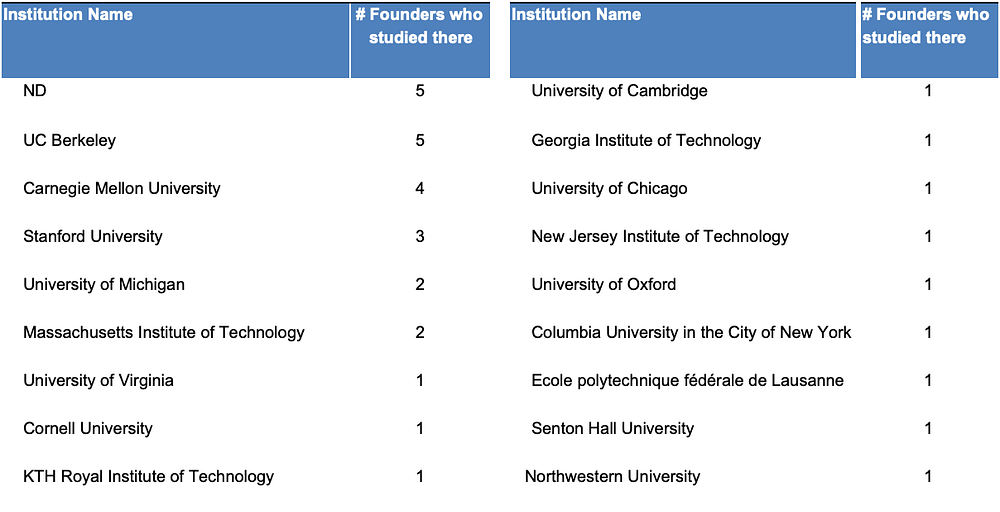Where ideas and founders of exceptional AI startups come from
Advice for deep tech startup founders on how to find a startup idea and a co-founder
This article was originally published in the DataDrivenInvestor publication on Medium, and scored 823 views (archived).
It’s a wonderful thing to be clever, and you should never think otherwise, and you should never stop being that way. But what you learn, as you get older, is that there are a few billion other people in the world all trying to be clever at the same time, and whatever you do with your life will certainly be lost — swallowed up in the ocean — unless you are doing it along with like-minded people who will remember your contributions and carry them forward.
Neal Stephenson, ‘The Diamond Age’.
Among various challenges a wannabe entrepreneur faces, challenges of finding a co-founder and finding the idea itself are probably the most painful ones; and even if these questions were multiple times addressed by investors and the wider community, I felt that providing an additional analytical perspective could be additive.
In this article I share insights from exploring biographies behind founding teams of ten of the most expensive artificial intelligence (AI) startups (chart 1). Specifically, I focus on how these teams came together and how they have arrived to doing what they are doing.
I hope this article will help data scientists, researchers and other techies to find approaches to better understanding themselves and finding like-minded people.

Exploring biographies of 33 individual founders allowed me to come up with the following understanding — despite the hype, an AI startup is not an overnight success, but a pivotal point on a long way of following a passion. Several anecdotal evidences could back this:
- 30 out of 33 founders have launched a startup in a field that was similar or adjacent to their previous work. For example, three co-founders of Aurora were involved in self-driving projects at Google, Uber, and Tesla. Four founding members of Cerebras worked at AMD, a chipmaker. Co-founders of CrowdStrike spend years at McAfee, before launching their own cyber security company;
- Out of 22 co-founders[1], 20 individuals spent more than 5 years between getting their bachelor degree and launching the last startup.
From an outside perspective, founding teams of selected AI startups do not seem to be random groups of individuals, but rather these teams are groups of people who naturally met each other. In the case of 3 startups, at least two co-founders studied in the same institution, and in the case of 8 startups, at least two co-founders worked in the same company before launching a company. For instance, co-founders of Quanergy worked at Amprius, co-founders of Nuro worked at Google, while co-founders of Databricks studied at UC Berkeley (Charts 2,3).

Teams appears to be well-balanced in terms of business/commercial expertise, and usually include 2–3 people. Out of 10 startups, just four did not have a business/commercial co-founder[2]. And even these four mostly compensated the lack of a pure business co-founder by someone who held managerial tech roles previously, for example, a CTO or a VP.

Based on what I’ve seen during my work at VC funds and while preparing this research, I can outline several things:
- If you can’t find an idea for a startup, explore your long-time passions, something you were constantly enjoying doing during your work/research/education. Alternatively, you might look at life changing events. For example, Tempus co-founders were motivated to launch a business based on the experience of a loved one being treated for cancer;
- To find a co-founder, go through people with whom you have shared experience, for example, you worked at the same company, researched the same theme, studied/worked at the same institution. Alternatively, use your personal network and ask for references. For example, co-founders of Zoox met after one of them was referenced to another by a mutual connection;
- Don’t underestimate business/commercial expertise, even the most brilliant engineers/researchers seem to team up with business people of the same brilliance, or at least gain a managerial experience themselves.
* I n my research, I focused on analysing AI companies from Europe, US and Israel that are still private and were founded since 2010. As a result, I came up with the list, that is different from the list of CB Insight. These 10 companies were founded by 33 individuals, whose publicly available biographies I’ve studied.
The reason for not including companies from other regions is purely the lack of data. With the aim to help wannabe founders, I also focused only on recently founded companies, that were launched in a more or less similar socio-economic context. I selected 2010 year as a cut-off date as it takes roughly 5–8 years to exit a startup, and I wanted to cover startups that are on their way to an exit. See stats: https://venturebeat.com/2017/05/19/vc-investing-still-strong-even-as-median-time-to-exit-reaches-8-2-years/
[1]Data on graduation year is available for 22 out of 33 individuals.
[2]Someone who previously held commercial/business roles.
[3] https://www.crunchbase.com/funding_round/databricks-series-e--037705fb#section-overview
[4] https://www.crunchbase.com/funding_round/graphcore-series-d--b2884bc3#section-overview
[5] https://www.crunchbase.com/funding_round/quanergy-series-c--9f910a75
[6] https://www.crunchbase.com/funding_round/tempus-3-series-e--f65601b6#section-locked-charts
[7] https://www.crunchbase.com/funding_round/zoox-series-b--351bc54f#section-locked-charts
[8] https://www.crunchbase.com/funding_round/crowdstrike-series-e--649d5ed0#section-overview
[9] https://www.crunchbase.com/funding_round/benevolent-ai-undisclosed--07acad77#section-overview
[10] Pitchbook
[11] https://www.crunchbase.com/funding_round/nuro-2-series-b--f7ca85b0#section-overview
[12] https://www.crunchbase.com/funding_round/aurora-6292-series-b--0a02d840#section-overview
Originally posted on Medium